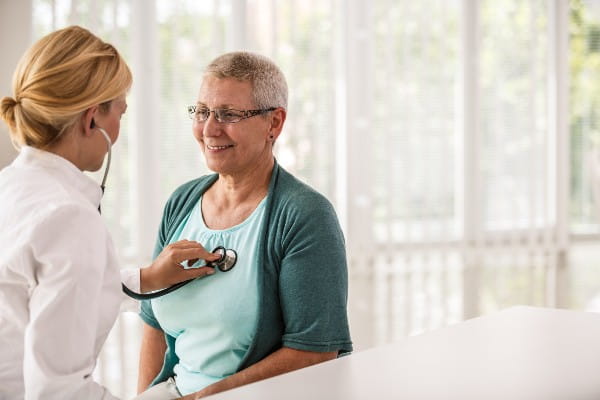While mammograms are the gold standard to diagnose breast cancer in women, doctors have also discovered they can give us clues about a woman’s cardiovascular health.
Research has revealed that, besides detecting breast cancer, mammograms can also identify what’s known as “breast arterial calcification,” which is calcium buildup in mammary arteries. These calcium deposits in arteries are an early sign of coronary artery disease even before plaque buildup is visible. Plaque in arteries blocks blood flow and can lead to heart attacks and strokes.
Going for a mammogram can be a nerve-racking experience for women, but they are the best line of defense to find breast cancer. Now, we also know that they can shed light on heart disease before it becomes too advanced. This is an important tool since heart disease is the number one cause of death among women.
Mammogram and heart disease connection
Calcium deposits that collect in the coronary arteries are known as “coronary artery calcification.” As calcium deposits increase, plaque builds up. Plaque consists of cholesterol, fatty substances, cellular waste products, calcium and fibrin, which is a clotting material in the blood. When plaque clots the arteries, the condition is called atherosclerosis.
“When we see calcium accumulate in arteries in the breast, we also become concerned that it’s happening in the heart’s arteries,” notes a Riverside cardiologist. “Coronary arteries supply critical oxygen-rich blood to the heart. When they become blocked, it can cause a heart attack.”
A 2010 Mount Sinai study was one of the first to show the link between breast calcification and coronary artery calcification. Similarly, a Korean study looked at records from 2006-2016 of nearly 300 middle-aged and older women who had both a mammogram and coronary calcium test within a year. Almost one-third of the women had breast arterial calcification. After accounting for other heart failure risks, such as age, diabetes and high blood pressure, women with calcium buildup in the breast arteries had 2.2 times the odds of having or developing heart failure.
Research is ongoing, but the studies to date seem to show that having breast arterial calcifications could point to a higher risk of heart attack, stroke and other cardiovascular diseases. Many questions remain unanswered, such as what should women do after breast arterial calcifications are found on their mammograms. Doctors or health care providers might suggest more screenings or even cholesterol-lowering medication such as statins.
Heart disease is leading cause of death for women
Cardiovascular disease is still the number one killer of women. In the years ahead, experts will keep researching ways to use the information gained from mammograms to help identify and treat coronary artery disease early.
“It is exciting to see how women’s cardiovascular health could move forward with this research,” says a Riverside cardiologist. “As mammograms are already broadly administered, being able to gain information on heart health from these tests would mean that the information is gained without any additional radiation exposure to patients and no additional costs. Women understand the importance of mammograms for early detection of breast cancer and make a point to get screened. Being able to use the existing process to also address cardiovascular disease in women, which actually kills more women each year than breast cancer, would be a great step forward in women’s heart health.”
Regular screening for both breast cancer and cardiovascular disease
Mammograms are not yet a regular tool for screening for cardiovascular health, but they are still an important tool in the early detection of breast cancer. Riverside breast cancer experts continue to recommend annual mammograms for women 40 and older, though some women with risk factors may need to start sooner. Talk to your primary care provider if you have questions about when you should begin getting mammograms. To schedule a mammogram please call our Central Scheduling office Monday to Friday from 8:30 a.m. to 5:30 p.m.:
- 757-989-8830, option 2 (Peninsula, Middle Peninsula, Williamsburg)
- 757-302-2102 (Eastern Shore)
To discuss your cardiovascular risk factors, talk to your primary care provider or cardiologist. To see a Riverside primary care provider call 757-534-5352 or 757-302-2102 on the Shore, to make an appointment or ask if you can be seen safely through a secure video visit To make an appointment with Riverside Women’s Heart Center to discuss your cardiovascular risk factors, please call the location nearest you.
- Riverside Regional Medical Center Clinic: 757-594-2074
- Port Warwick Clinic: 757-873-0360
- Hampton Clinic: 757-827-7754
- Williamsburg Clinic: 757-259-9540
- Gloucester Clinic: 804-694-5553



